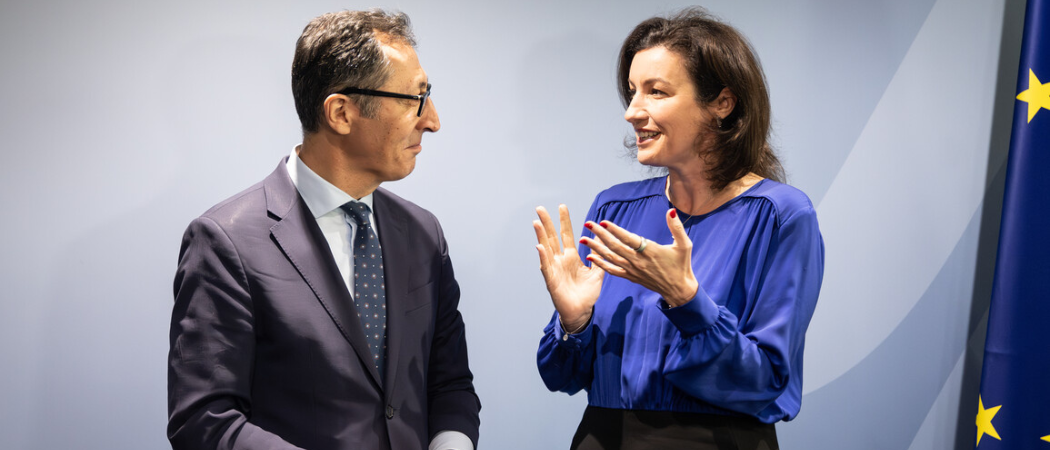Dorothee Bär has promised space travel, a computer games unit in her new ministry and less bureaucracy

Cem Özdemir (left), the previous Federal Minister of Education and Research, hands over official duties to Federal Minister Dorothee Bär (right) on 7 May 2025, in Berlin. Photo credits: German Federal Ministry of Research, Technology and Space
Science|Business - Table.Media partnershipScience|Business has partnered with Table.Media, a leading source of news about higher education and research in Germany. Each week, we are publishing one of each other’s stories to give readers an even broader range of insight into R&D policy across Europe. |
In her first government statement, Germany’s new minister for research, technology and space, Dorothee Bär, described the mission of her new “Ministry for the Future” as something between a cordless screwdriver, quantum technology and a pinch of stardust.
A member of the Christian Social Union, the Bavarian conservative party that forms part of the new German government that was sworn in this month, Bär presented herself as open to technology, approachable and thoroughly self-confident.
The name of her newly created ministry, BMFTR, which has shed education but gained a remit for technology and space, is to be pronounced “BMFuTuR” according to the ministry's social media campaign. In other words, Germany needs a “future” ministry that unleashes innovative power and at the same time ensures scientific freedom.
Here, Table.Media explains her priorities.
Space travel as a top priority. Bär opened her speech to Germany’s parliament last week with a plea for a research policy that is open to technology. She called space travel a central lever for social progress, not just as a symbol, but as a practical driver of innovation.
“We are not in a spaceship here, but we want to develop things that have a very practical use: from cordless screwdrivers to equipment for fire departments in rural areas,” Bär said. Space travel must therefore become a “top priority” for the federal government.
Research for women’s health. At the same time, she emphasised her ambitions in the field of health research, in particular for diseases that have so far been little researched, such as chronic fatigue syndrome, and in women's health. The general aim is to translate research more quickly into social and economic added value, for example via the new umbrella brand “initiative for research and application.” Universities of Applied Sciences should also play a stronger role here.
High-tech agenda, bureaucracy reduction and a new games department. With her planned high-tech agenda, Bär wants to specifically promote key technologies such as artificial intelligence, quantum research and climate-neutral mobility.
At the same time, a Freedom of Innovation Act is intended to reduce bureaucratic hurdles. Referring to a phrase invented by Rafael Laguna de la Vera, founding director of the innovation agency Sprind, Bär wants science and innovation to be more like a “chocolate factory,” full of excitement and wonder, and less like a “galley,” bogged down by form-filling and red tape.
As a rather unusual addition, she also announced a separate department for computer games. As Bär sees it, games are a highly innovative cultural and economic sector with potential for research and technology transfer.
Reactions in the parliament: praise, warnings, criticism. The debate revealed differing assessments: Florian Müller (Christian Democratic Union) supported Bär’s technology policy course, but called for a more decisive reduction in bureaucracy and better conditions for spin-offs.
Ayse Asar (Greens) warned against a one-sided focus on Bavaria and criticised the lack of higher education policy approaches. Nicole Gohlke (Left Party) said Bär was missing a strategy against precarious academic working conditions and student poverty. She feared that the focus on technology and space travel would overshadow the “earthly problems in science.”
Holger Mann (Social Democratic Party), the last speaker of the debate, supported the goal of strengthening Germany as a location for innovation. However, he called for a realistic perspective on implementation. “Anyone who talks about excellent research, technology and transfer must not remain silent about working conditions in research and teaching,” said Mann.






 A unique international forum for public research organisations and companies to connect their external engagement with strategic interests around their R&D system.
A unique international forum for public research organisations and companies to connect their external engagement with strategic interests around their R&D system.